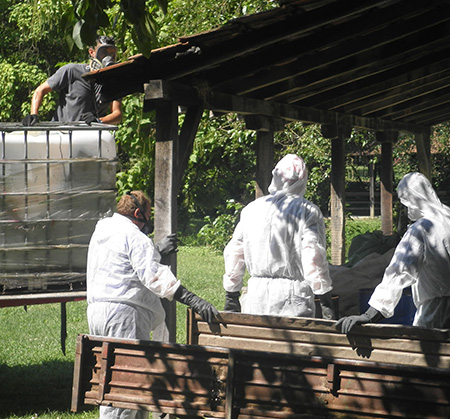Forests are of invaluable importance for the conservation of the environment. They protect the environment from pollution and, in a sense, they are its creator, guard and stabilizer. A larger forest cover provides better air quality, since annually the forest produces 800 tonnes of oxygen on one hectare only.
In addition, forests are an important factor in the stability of climate elements and natural occurrences. The forest ionizes the air and purifies it from dust. One hectare of coniferous forest filters 30 to 35 tonnes of dust in a year, and 50 to 76 tonnes of dust is filtered in one hectare of deciduous forest.
Other existential natural resources, such as water, also depend on forests. Forests affect rainfall quantity and distribution, water flow in nature, wellspring formation, water quality and quantity. Only one hectare of beech forest holds about 500 tons of water.
 Environmental protection involves identifying all the negative impacts that lead to change, with the aim of preventing degradation, pollution, destruction, as well as excessive consumption of raw materials. This requires taking a series of legal, technical and technological measures that can best prevent the causes, mitigate or remedy the environmental consequences. Environmental priorities are the long-term management of natural resources, soil, water, landscapes, with an integrated approach in combating pollution and preventing waste generation, reducing energy consumption (especially from non-renewable sources), improving management and developing efficient and clean modes of transport and production.
Environmental protection involves identifying all the negative impacts that lead to change, with the aim of preventing degradation, pollution, destruction, as well as excessive consumption of raw materials. This requires taking a series of legal, technical and technological measures that can best prevent the causes, mitigate or remedy the environmental consequences. Environmental priorities are the long-term management of natural resources, soil, water, landscapes, with an integrated approach in combating pollution and preventing waste generation, reducing energy consumption (especially from non-renewable sources), improving management and developing efficient and clean modes of transport and production.
The basic principle on which the implementation of the environmental policy is based is the precaution and prevention principle. Specifically, each activity must be planned and implemented in such a way as to cause the least possible change in the environment and to present the least risk to human and animal health, reduce the burden on space and the consumption of raw materials and energy.
Environmental protection is an integral part of the effective business strategy of the State Enterprise “Srbijašume”. Environmental policy is implemented through the management of natural resources based on the principles of sustainable development. All activities related to environmental protection are carried out in accordance with legally defined procedures, implementation of preventive measures, introduction of innovative approaches and raising environmental awareness at the level of planning, design, as well as during the execution of forestry works. These activities are implemented through medium-term and annual plans in accordance with the Enterprise’s Business Policy and its Environmental Strategy.





